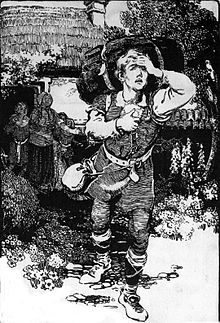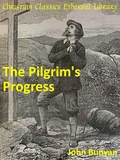John Bunyan – This Is No Tall Tale
 We think of speculative fiction as a fairly new art form. After all, who ever heard of anyone writing about fantasy worlds and that sort of thing in, say, the 17th century? Anyone who’s ever heard of John Bunyan’s classic allegory, The Pilgrim’s Progress, that’s who.
We think of speculative fiction as a fairly new art form. After all, who ever heard of anyone writing about fantasy worlds and that sort of thing in, say, the 17th century? Anyone who’s ever heard of John Bunyan’s classic allegory, The Pilgrim’s Progress, that’s who.
(We’re talking John Bunyan here, by the way, not Paul Bunyan, the big dude with the even bigger blue ox whose hoof prints created the Great Lakes. Have you seen those things? That critter must have had really big feet!)
Though no one described it as “speculative fiction” at the time, The Pilgrim’s Progress fits the definition. Rudyard Kipling is quoted as saying Bunyan was the father of the novel. If that be true, it would mean the first novel was Christian speculative. Take that, all ye who would dismiss the genre!
The Pilgrim’s Progress was an immediate success when published in 1678, and it’s enjoyed steady popularity ever since, even being translated into more than 200 languages. Bunyan was hardly a one-hit wonder, however. With some 60 published works to his credit, he was one of the most prolific authors of his day.
But for all his literary fame, Bunyan had little education.
His family appears to have lived in Bedfordshire, England, from the twelfth century through modern times. Despite living in very humble circumstances, Bunyan’s parents managed to send him to school, at least for awhile. We know that as a boy, he also worked with his father, learning the brazier’s trade (the making and mending of pots and kettles), and it appears his school career was short.
His mother died in 1644 and his father remarried two months later. This may have caused a falling-out between father and son, for on Bunyan’s sixteenth birthday, he joined the army.
England was engaged in a civil war at the time, with Oliver Cromwell leading the Parliamentarians against the Royalists and King Charles. The conflict was as much a religious war as civil, with Cromwell’s faction seeking (among other things) an end to the Church of England’s monopoly on worship in England.
This was only one of the numerous religious conflicts that plagued Europe in that era. Religion was big in those days—nearly everyone was religious, though it can probably be safely presumed that the majority of the people then, as now, weren’t what we’d call “saved.”
After the war (which the Parliamentarians won, by the way), Bunyan returned home to help in his father’s business, and he married soon thereafter. Little information exists about his wife—not even her name—except for that fact that she came from poverty as he did. She did, however, bring to the marriage two possessions, gifts from her father. Bunyan wrote: “This woman and I, though we came together as poor as poor might be (not having so much household stuff as a dish or a spoon betwixt us both), yet this she had for her part, The Plain Man’s Pathway to Heaven and The Practice of Piety.” With these two books and the help of his new bride, he re-learned to read, having apparently forgotten since his short childhood education.
married soon thereafter. Little information exists about his wife—not even her name—except for that fact that she came from poverty as he did. She did, however, bring to the marriage two possessions, gifts from her father. Bunyan wrote: “This woman and I, though we came together as poor as poor might be (not having so much household stuff as a dish or a spoon betwixt us both), yet this she had for her part, The Plain Man’s Pathway to Heaven and The Practice of Piety.” With these two books and the help of his new bride, he re-learned to read, having apparently forgotten since his short childhood education.
These volumes had as profound an effect upon him spiritually as they did on his literary skills. He began to have terrifying visions. He’d always been moody and introspective, even as a child, but the more he read these religious works, the more distressed he became.
Steeped in religion though he was, Bunyan was, like all of us, a sinner from birth. He was a prankster and popular man about town, including with the ladies, and his creativity with profanity gave him a reputation as having few equals in the art of “cursing, swearing, lying, and blaspheming the holy name of God.”
The Holy Spirit gave him no peace. The more he cursed and caroused, the more miserable he grew, until he felt compelled to turn over a new leaf. One by one, he abandoned his vices, started going to church regularly (the Church of England), and tried reading the Bible. Apart from the historical parts, though, he just couldn’t get into the Scriptures. He later wrote: “Paul’s Epistles, and such-like Scriptures I could not away with.”
Despite his determined efforts to live righteously, peace escaped him—until the day he ran across some old women sitting out in the sunshine discussing the things of God. As he listened to their conversation, he realized they had something he’d never been able to find. He prayed like never before, asking God to open his eyes to the truth and not leave him in blindness.
Soon thereafter, he began attending the church the old women went to. It was one of those renegade, or Nonconformist, churches. These days we’d probably call it nondenominational. At one point soon after he got involved there, he underwent a transformation and, as he put it, he became a servant of Jesus Christ. With the help of the pastor, John Gifford, he began studying his Bible and became increasingly eager to tell others about the new life he’d found. Upon further Bible study, as well as much poring over a worn copy of Luther’s commentary on the Epistle to the Galatians, he began to preach every chance he got.
But meanwhile, back at the palace, the Parliamentarians lost control of the government. Oops. No more freedom of religion. By the time John Bunyan took up preaching, the king was on the throne again, and he shut down all the meeting-houses of the Noncomformists. The separatists continued to worship in secret, but when the preachers could be routed out, they were thrown into prison.
Despite the danger, Bunyan made no bones about his being a dissenter. In fact, he began his writing career about a year after he’d begun preaching, publishing pamphlets and books based upon his messages. His first, Some Gospel Truths Opened, appeared in 1656.
Perhaps because he was considered just a poor tinker (or possibly they still considered him just a good old boy trying to have some fun?), the authorities didn’t see him as worth prosecuting. But as he continually preached, traveling the countryside and encouraging the nonconformists to stand true to their faith, they finally put their foot down. He was arrested in 1660 while conducting a worship service in a farmhouse.
At trial, he was convicted of “perniciously abstaining from coming to church to hear Divine Service, and for being a common upholder of several unlawful meetings and conventicles to the great disturbance and distraction of the good subjects of this kingdom.”
During the two decades that followed, he was in and out of prison several times. Sometimes the Act of Uniformity was in force (requiring all public worship to be according to the Liturgy of the Church of England); then later, the tide would shift. Bunyan would be released only to be imprisoned again. But whether in bonds or free, he followed Paul’s example and never stopped preaching.
Bunyan did a lot of writing during his first and longest incarceration (from 1660 to 1672), though recent evidence seems to indicate he wrote The Pilgrim’s Progress during a later imprisonment.
Thanks to his writings, The Pilgrim’s Progress in particular, Bunyan was the best-known Nonconformist in England. In 1680 he published The Life and Death of Mr. Badman, intended to be the counterpart of The Pilgrim’s Progress, showing the progress (or rather, regress) of the unrepentant sinner. It never achieved popularity, though, as it lacked the liveliness of its predecessor and its subject matter was so unpleasant. (Besides that, the title’s pretty lame.) As well received as Pilgrim was, his most popular book during his lifetime was the allegory Grace Abounding. This was an account of the defense of the City of Mansoul against the attacks of the Devil. He also wrote another allegory, The Holy War, in the 1680s. Yep – John Bunyan wrote Christian spec-fic.
As a popular author and preacher, Bunyan exerted considerable influence, and was invited to speak all over England. In 1688 he traveled to London to mediate a reconciliation between a father and a son. After being caught in bad weather, he became ill and died three months before his 60th birthday.
 John Bunyan’s world was far removed from ours in just about every aspect. Nevertheless, The Pilgrim’s Progress still resonates despite the passing of time and cultural changes. The scenarios Bunyan depicted are relevant and recognizable in today’s world. Bunyan’s Savior is our Savior; we share a common experience, a common inheritance, and a common enemy. Such commonality—something we can each relate to—makes for an enduring, classic tale.
John Bunyan’s world was far removed from ours in just about every aspect. Nevertheless, The Pilgrim’s Progress still resonates despite the passing of time and cultural changes. The scenarios Bunyan depicted are relevant and recognizable in today’s world. Bunyan’s Savior is our Savior; we share a common experience, a common inheritance, and a common enemy. Such commonality—something we can each relate to—makes for an enduring, classic tale.
I expect the pilgrim, Christian’s, story will be remembered long after Paul Bunyan’s ox has been forgotten.
Interested in reading more of John Bunyan’s works? The John Bunyan Library has an extensive collection.




































Interesting! I’d never thought of John Bunyan in those terms before!
Now you’ve got me thinking about how far the tradition of Christian speculative fiction goes back . . . Bunyan probably lays claim to the first novel. But Edmund Spenser’s epic-length poem Fairy Queene would be Christian spec-fic as well, and it was published in 1590! And you could even consider the morality play Everyman (1510) to fall in the same category. Beowulf is spec-fic with some Christian elements.Hmm . . . even Caedmon’s Hymn (c. 658-680), the oldest work written in English, mentions “middle-earth”! 🙂
I’m thinking you could have a whole series on the history of Christian speculative fiction!
Guess we’re not the weird ones after all . . .
Sorry, nope. The distinction of first novel goes to Murasaki Shikibu’s “Tale of Genji,” which is at least 500 years older than “Pilgrim’s Progress.” Even in western Europe, “Don Quixote” by Cervantes beats “Pilgrim’s” out by at least fifty years.
Go ahead and be enthusiastic, but I can’t sit by and let fact errors propagate.
When I was in school, I was taught that the first fully-formed novel was Pamela, or Virtue Rewarded by Samuel Richardson, published in 1740. I’m not going to argue that Richardson’s book deserves the distinction. The point is that no one author suddenly produced a book that had all the features of a novel. What is a novel? The definition of the novel even changed as recently as the 20th century; C.S. Lewis didn’t use the word the same way we do in his criticism.
Bunyan’s The Pilgrim’s Progress and Cervantes’ Don Quixote are both important proto-novels. Were they novels? I don’t know about Don Quixote, but The Pilgrim’s Progress is not quite written in prose, as far as I know. It looks kind of like a stage script, except, as far as I know, it was never intended to be performed. The text of The Summoning of Everyman looks pretty much the same, I think.
Anyways, the title of “World’s First Novelist” is clearly relative. Bunyan could be said to deserve it, as could Cervantes, or Richardson, or probably many other early writers.
I’ll agree with you that the definition of a novel is fuzzy, but Bunyan doesn’t have strong claims on any firsts. It doesn’t really matter in the end, but comments like the first in this thread annoy me for admittedly pedantic reasons.
Sorry about that — it would indeed be terribly hard to pin down the first novel! And I did say Bunyan might claim the first novel.
Personally, I just thought it was exciting to think about the history of our favorite genre as going back further than Lewis and Tolkien.
I never intended the emphasize to be concerning who was first; Kipling’s “father of the novel” moniker was a starting place for the discussion (and I can see it worked!). The point is that Christian speculative fiction, rather than being an upstart, has a long and respected tradition.
An interesting account of Bunyan’s life! Thanks, Yvonne!
When I was growing up my parents started a homeschool group which they named “John Bunyan Academy” in honor of him. The official mascot was the pilgrim (although, the unofficial and more memorable mascot was a rubber chicken…heehee). I never much liked “Pilgrim’s Progress” – but thinking of it as the first Christian spec-fic puts it in a new light! 🙂
I have enjoyed and benefitted from reading The Pilgrim’s Progress, and can see why it would be called speculative fiction. That said, if it were written today, we would be calling it bad speculative fiction. Not only was it heavy-handed, but it was an out and out polemic that makes Tom Clancy look subtle by comparison. Any issue, spiritual, economic, political, what have you, Bunyan spoke on. And he spoke in a way that made it clear that if you didn’t agree with him on just about every issue, including those not clearly stated in the Bible, you were going to burn in hell. So, since he was a mercantilist type of fellow, these new economics of Adam Smith were clearly the devil’s brew, and you would burn forever if you supported it.
I’m not going against his influence or the quality of his work as a spiritual document, but he was a polemicist, and what’s more, he seemed to relish the idea of those he disagreed with having the characters who represented them truly suffering. A tad too violent for me.
Interesting comments, all! It was Kipling who called Bunyan the father of the novel, not me; and how accurate his perspective was is up for grabs.
As others have said, if Pilgrim’s Progress is a novel, it’s not a very good one by modern standards. But then, he wrote it in different times, when people were thrown in jail or executed because they used the wrong liturgy in their church services, and nations went to war for the sake of their version of Christianity.
Though I don’t believe it’s fair to judge a 300-year-old work by the standards of our modern culture, I will say when I tried to read Pilgrim’s Progress 25 years ago or more,I thought it would be a dynamite cure for insomnia. Bunyan’s personal story interests me far more.
We had an audio drama version, complete with voice acting, that us kids listened to over and over. But we’d have to stop now and then and put on an Odyssey or something, to listen to something where people talked normal.
I still ponder the Giant Despair part. It’s a fantastic metaphor for depression.